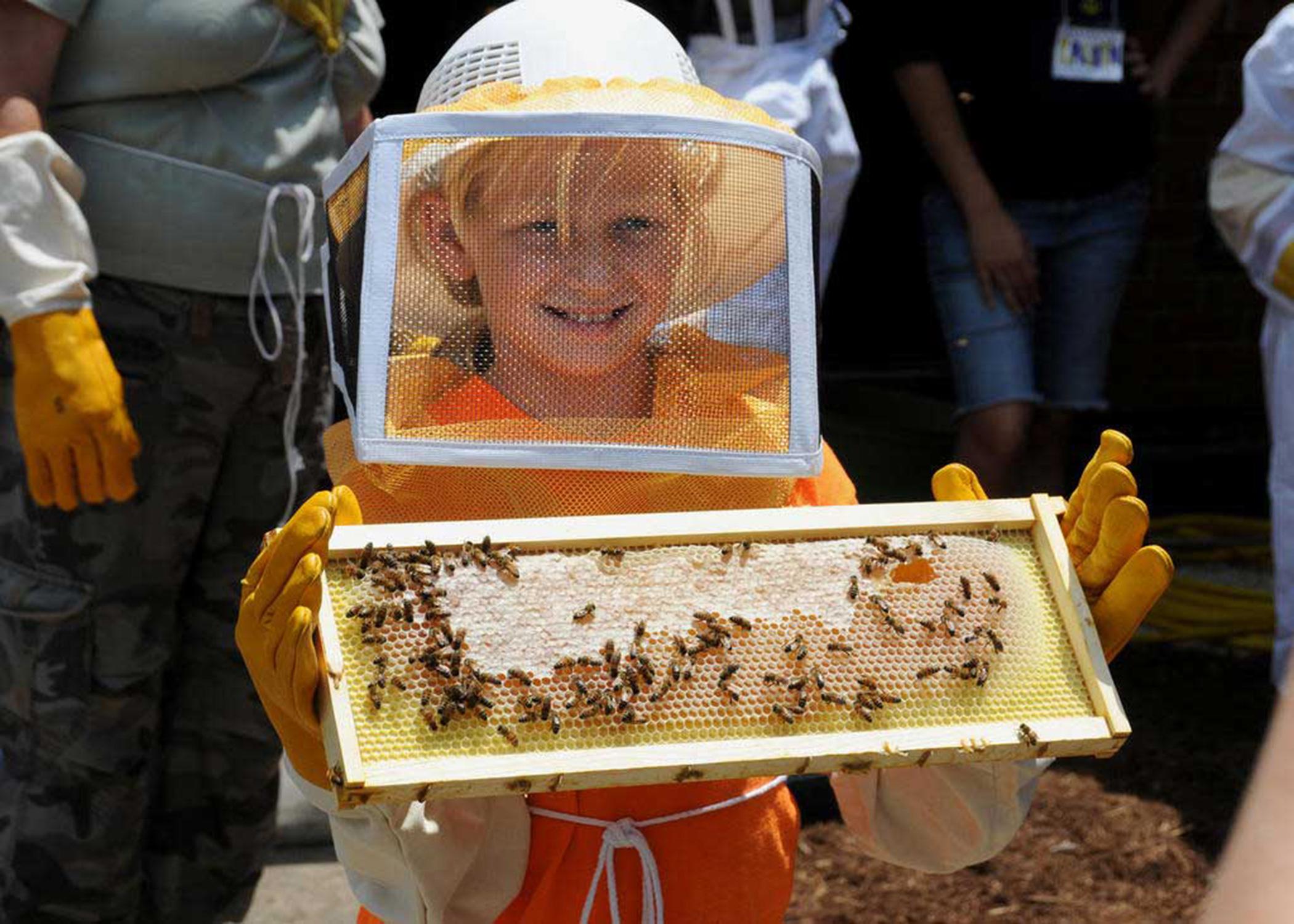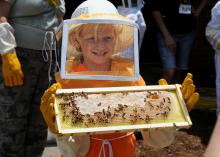Information Possibly Outdated
The information presented on this page was originally released on March 21, 2014. It may not be outdated, but please search our site for more current information. If you plan to quote or reference this information in a publication, please check with the Extension specialist or author before proceeding.
Consider beekeeping for fun and profit
MISSISSIPPI STATE -- If thoughts of keeping bees have been buzzing in your head, you’re not alone.
“Beekeeping can be a fascinating hobby, a profitable sideline, or a full-time occupation,” said Jeffrey Harris, beekeeping specialist with the Mississippi State University Extension Service.
Mississippi is home to approximately 12 full-time commercial beekeepers, 35 part-time honey producers, and several hundred hobbyists. The state ranks twenty-eighth in the nation in honey production, with about 2.25 million pounds of honey produced each year.
Mississippi beekeepers tend about 16,000 colonies of bees, compared to 932,000 colonies in the nation’s top-producing states. However, the magnolia state leads the country in yield -- a whopping 98 pounds of honey per colony.
You can start a colony pretty much any time of year in the South, but spring is ideal because it gives the colony enough time to get established. Additionally, you’ll have better opportunities in the spring and summer to observe your bees and learn their behaviors.
There are several options for getting started in the bee business, whether for fun or profit:
- buying package bees;
- purchasing a nucleus colony, or nuc;
- buying established colonies;
- collecting swarms; and
- taking bees out of trees and walls.
Most novice beekeepers will start with either a package or nuc. The downside to purchasing a nuc or an established colony is that you also might be buying another beekeeper's problems, such as disease. The last two options are not recommended for novice beekeepers.
You’ll want to start with at least two colonies of bees, just in case something goes wrong with the queen in one of the hives. A frame of eggs and young larvae from the second hive can be given to the queen-less unit so they can raise a new queen.
If you keep bees you will almost certainly be stung at one time or another. For most people, a bee sting hurts and is uncomfortable for a while.
However, for about 0.4 percent of the population, a bee sting can cause death from anaphylactic shock. If you know you are allergic to bee stings then beekeeping may not be the hobby for you. Symptoms of an allergic reaction include hives over the body, itching in areas of the body remote from the sting, and shortness of breath or tightening of the windpipe. If you do experience such symptoms after being stung by a bee, seek emergency medical attention immediately.
At a minimum, you’ll need a veil, hive tool and bee smoker. The veil keeps bees away from your head because stings on the head can be quite painful. You can purchase a special hat to hold the veil, but a well-fitting wide brimmed hat will do as well. The bee smoker keeps the bees from becoming agitated, allowing the beekeeper to work in peace.
Optional accessories include a bee suit, bee gloves, and high top boots. Combined with a veil and hat, a beekeeper can be well-protected from bee stings during normal beekeeping operations.
You can build a beehive from new materials, but it is better to purchase a hive that has had bees in it for at least a year to lessen the risk of stressing out the bees and reducing your potential honey crop. The best time to buy bees is in the spring, to ensure that you get a viable hive with a good laying queen.
To harvest your honey crop, you’ll first need to separate the combs of honey from the bees, which is called pulling the honey. Using a bee brush to sweep the bees from each frame is one option, but that can become labor intensive if you have a lot of hives. Bee escape boards are used to direct the bees into a one way trip out of the honey supers. You’ll need one escape board for each hive.
Once you pull the honey, you can extract it yourself or ask an experienced beekeeper to extract it for you. Extracted honey needs to be strained through cheesecloth or nylon and then stored in a warm place in a tall container. This allows the fine impurities to rise to the top. The ideal storage container will have an outlet at the bottom so the clean, warm honey can be drawn from the bottom directly into the honey containers.
Setting up a colony is just one of the factors involved in the beekeeping business. If you sell your honey, you will need to develop a business plan to determine several factors including the costs, potential returns, years to profit, and labor needed to run of the business.
Developing a strategic marketing plan for the products you wish to sell and services you will offer is another critical component.
For more information about beekeeping for fun or for profit, contact Jeffrey Harris, MSU Extension beekeeping specialist at 662-325-2976.

Editor’s Note: Extension Outdoors is a column authored by several different experts in the Mississippi State University Extension Service.
Your Extension Experts
Related News
Pages
Related Publications
Pages
- « first
- ‹ previous
- 1
- 2
- 3




